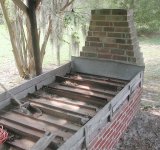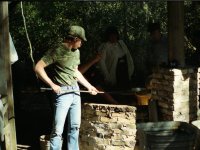OLDNAVYMCPO
US Veteran, Absent Comrade
Life is change. The places of our youth are never the same when later revisited.
My maternal grandparents were an odd couple. My Grandfather, whom I never knew, came to America at a very young age, alone, as an indentured servant. He was an immigrant from Lebanon. He served out his obligation in a mercantile store in Mobile, Alabama. He later moved to a nearby rural town and opened his own general store.
My Grandmother was second generation Irish, she was half Grandfather's age. She worked in his store before they married.
During the Great Depression, a black youth was orphaned and I never knew the circumstances but my Grandparents took him in and raised him even though they were raising children of their own. This was a highly unusual circumstance for that time and place. His name was Romeo Johnson. He lived with my Grandparents until adulthood and was even educated at Tuskegee Institute.
My Grandfather died early and left my Grandmother with six kids to raise. She was left with a heavy burden as the business had failed and her home had burned to the ground.
She started over, no welfare or food-stamps in those days. She opened a small eatery, serving breakfast and selling sack lunches for saw mill workers. The black boy she raised became a wealthy businessman, a highly unlikely circumstance in rural Alabama in the 1940's.
Romeo, or "Rome" as he was known, was my pal and teacher until I was 8 years old and moved away. At the time, Rome was in his early thirties but tolerated me tagging along at every opportunity. He took me fishing, cane poles off river banks. Took me hunting, opossums, coons, rabbits and squirrels. I hung out at his grocery store almost every weekend, the only white child in miles.
I have lots of memories of our times together. One of my fondest and most distinct memories is of the day we attended a cane press.
We had gone fishing that morning and had some luck. On the way home, we spotted a crowd of men gathered off the side of the road, down in a hollow near a creek. Rome said that they were going to make pure cane syrup. Rome knew the old man that owned the press so we pulled off the road for a visit.
The press was a large cast iron piece of machinery. It had gears that meshed together that mashed the juice out of the cane. It was bolted to a large oak stump with a long pole extending from the press. A mule in harness at the end of the pole walked in a circle to turn the gears. The cane was hand fed, many sticks at a time into the press. The guy doing the feeding had to duck under the pole each time it passed.
The sugar cane juice bleed off into a long pipe into a metal trough where it was cooked into syrup.
The farmers that were processing their cane stood around a fire and passed a bottle, talked and chewed tobacco. I drank a tin cup of juice as it came out of the press. Some man gave me a gallon can of pure cane syrup to take home.
I'll never forget that day.
My maternal grandparents were an odd couple. My Grandfather, whom I never knew, came to America at a very young age, alone, as an indentured servant. He was an immigrant from Lebanon. He served out his obligation in a mercantile store in Mobile, Alabama. He later moved to a nearby rural town and opened his own general store.
My Grandmother was second generation Irish, she was half Grandfather's age. She worked in his store before they married.
During the Great Depression, a black youth was orphaned and I never knew the circumstances but my Grandparents took him in and raised him even though they were raising children of their own. This was a highly unusual circumstance for that time and place. His name was Romeo Johnson. He lived with my Grandparents until adulthood and was even educated at Tuskegee Institute.
My Grandfather died early and left my Grandmother with six kids to raise. She was left with a heavy burden as the business had failed and her home had burned to the ground.
She started over, no welfare or food-stamps in those days. She opened a small eatery, serving breakfast and selling sack lunches for saw mill workers. The black boy she raised became a wealthy businessman, a highly unlikely circumstance in rural Alabama in the 1940's.
Romeo, or "Rome" as he was known, was my pal and teacher until I was 8 years old and moved away. At the time, Rome was in his early thirties but tolerated me tagging along at every opportunity. He took me fishing, cane poles off river banks. Took me hunting, opossums, coons, rabbits and squirrels. I hung out at his grocery store almost every weekend, the only white child in miles.
I have lots of memories of our times together. One of my fondest and most distinct memories is of the day we attended a cane press.
We had gone fishing that morning and had some luck. On the way home, we spotted a crowd of men gathered off the side of the road, down in a hollow near a creek. Rome said that they were going to make pure cane syrup. Rome knew the old man that owned the press so we pulled off the road for a visit.
The press was a large cast iron piece of machinery. It had gears that meshed together that mashed the juice out of the cane. It was bolted to a large oak stump with a long pole extending from the press. A mule in harness at the end of the pole walked in a circle to turn the gears. The cane was hand fed, many sticks at a time into the press. The guy doing the feeding had to duck under the pole each time it passed.
The sugar cane juice bleed off into a long pipe into a metal trough where it was cooked into syrup.
The farmers that were processing their cane stood around a fire and passed a bottle, talked and chewed tobacco. I drank a tin cup of juice as it came out of the press. Some man gave me a gallon can of pure cane syrup to take home.
I'll never forget that day.







